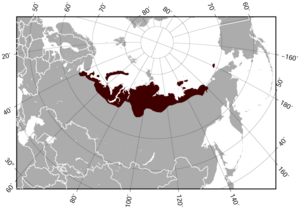West Siberian lemming facts for kids
Quick facts for kids West Siberian lemming |
|
|---|---|
 |
|
| Conservation status | |
| Scientific classification |
|
| Kingdom: | Animalia |
| Phylum: | Chordata |
| Class: | Mammalia |
| Order: | Rodentia |
| Family: | Cricetidae |
| Subfamily: | Arvicolinae |
| Genus: | Lemmus |
| Species: |
L. sibiricus
|
| Binomial name | |
| Lemmus sibiricus (Kerr, 1792)
|
|
 |
|
| Siberian brown lemming range (includes range of East Siberian lemming) | |
| Script error: The function "autoWithCaption" does not exist. | |
| Synonyms | |
|
Lemmus lemmus chernovi Spitsyn et al., 2021 |
|
Script error: No such module "Check for conflicting parameters".
The West Siberian lemming (Lemmus sibiricus) is a small, furry animal. It is also known as the Western Siberian brown lemming. This lemming is a type of true lemming. It lives in the country of Russia. Like other lemmings, it is a kind of rodent. Rodents are a group of mammals that includes mice, rats, and squirrels.
Contents
Where Do West Siberian Lemmings Live?
These lemmings live only in Russia. They are found across a huge area called Siberia. Their home stretches from the White Sea in the west. It goes all the way east to the Verkhoyansk Range of mountains. These mountains act like a natural wall. They separate the West Siberian lemming from its close relative, the East Siberian lemming.
Scientists once thought these two lemming types were the same. Now, they know they are different species.
What About the Novaya Zemlya Lemming?
There is a group of lemmings living on islands called Novaya Zemlya. These islands are north of mainland Russia. In 2021, a study looked at their DNA. The study suggested these island lemmings might be a type of Norway lemming. They were even given a special name, L. l. chernovi.
However, other scientists are still checking this idea. The American Society of Mammalogists thinks they are still West Siberian lemmings. They believe the island lemmings might have some old DNA from Norway lemmings. This is a topic scientists are still learning about!
Life and Habits of the West Siberian Lemming
West Siberian lemmings do not sleep through the winter. This is called hibernation. Instead, they stay active all year long. They live in underground tunnels and burrows. These burrows help them stay safe and warm.
What Do They Eat?
Lemmings are mostly herbivores. This means they eat plants. They munch on grasses, mosses, and other small plants. They find food even under the snow in winter.
Who Are Their Predators?
Many animals hunt West Siberian lemmings. They are an important food source for predators in the Arctic. Some of their main hunters include the snowy owl. The Arctic fox also preys on them. Other animals like weasels and wolves might hunt them too.
Why Do Lemming Numbers Change So Much?
Like other lemming species, their numbers go up and down a lot. This is called a population cycle. Sometimes there are huge numbers of lemmings. Other times, there are very few. Scientists are still studying why these populations change so dramatically. These cycles affect many other animals in the Arctic. When lemming numbers are high, predators have lots of food. When lemming numbers are low, predators might struggle to find food.
Images for kids
 | Aurelia Browder |
 | Nannie Helen Burroughs |
 | Michelle Alexander |




